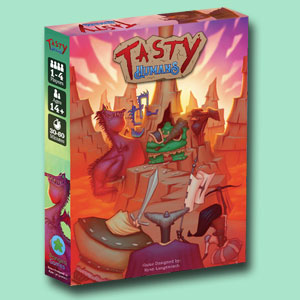One of the most jarring experiences for new game developers is the process of getting their game reviewed. Oh, the pain of sending your precious brainchild to someone to publicly judge! Drama aside, it truly is difficult at first because you have to identify reviewers, send prototypes, make sure your game is ready enough, cross your fingers, and hope they like it. Sometimes you even have to compensate the biggest names for their time and effort.

Need help on your board game?
Looking for more resources to help you on your board game design journey?
This is a lot to manage, so it begs the question: why are game reviews such a big deal anyway? To many of you readers, the answer is obvious, but I don’t like leaving assumptions unexamined. As you learn the difficult trade of board game development for the first time, it’s especially important to ask yourself “why” and be persistent in your questioning until the questions of “why” are followed by “because” and a specific reason.
Game reviews build trust
Would you spend $50 on someone you don’t know? Probably not. Well, at least I wouldn’t, because I’m a total tightwad in the wallet department. You can’t expect people to spend money on your game if they don’t have a reason to believe it’s going to be good.
There’s a lot of ways to suggest that your game is going to be good. You can release a free PNP version. You can give it gorgeous art. You can tell stories of your relentless play-testing process. You can keep a dev diary. But let’s be honest here: there’s no proof like social proof. There’s no better guarantee that a game is going to be good than someone playing it and saying “it’s good.”
A few good reviews will make it much easier for you find your first few hundred fans and get ratings on Board Game Geek.
Game reviews save time
Folks are busy. Your average board gamer is somewhere around 30, which means they’ve probably got a full time job (which is typically closer to a 45-50 hour deal than the elusive 40). They might have a significant other or kids. They’ve probably got social obligations.

How much time can potential buyers squeeze out of their day for a stranger? The answer is “not very much,” even if the will is there. And again, you’re probably a perfect stranger to them and don’t have their trust yet. Reviewers save them a bunch of time and give them a rough, approximate understanding of what your game has to offer.
Reviews are great marketing, even when they’re not good
When they’re good at what they do, reviewers connect with their audiences, even if their audience isn’t very big. Don’t write off a reviewer based on subscriptions or web traffic. Look for engagement – comments, likes, conversation, and social media traffic.
If they don’t like your game, that’s fine! Their fans might talk bad about you, but a handful might still check you out regardless. A good reviewer will tell their fans what a game is like, even if they didn’t enjoy it.
Game reviews establish communities
People tend to form communities around common interests and dislikes. Reviews are all about talking about interests and dislikes within a narrow range of discussion. That tight focus makes for lively discussion, and it helps spread the word of your game.
Game reviews help you hone your skills
Reviews are primarily a service to board game fans, but that doesn’t mean you can’t learn from them, too! Board game reviews are a valuable source of information on how design decisions you make are received. If something slips through your playtesting, it might very well be caught in the review stage. By then, it might be too late to make corrections to your game, but it will allow you to create a better second game.




